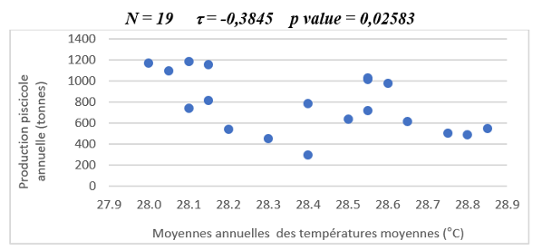Background
The Bagré Dam was built in 1993, creating an artificial and permanent lake in the southeast of Burkina Faso. After more than twenty years of promoting fishing to reduce poverty and food insecurity, the observation is stark: fish are becoming scarce in Bagré. Fishing production fell from 1,000 tonnes per year in the 1990s to 300 tonnes in 2012. We must therefore investigate the causes of this significant decline. Are fishing methods and environmental pollution the only causes of the observed drop in production? Can climate-related factors influence fishing productivity? How can the fishing industry adapt to current climate-related issues? This study aims to offer some answers to these questions.
Description
Statistical analysis of climate data during the past 30 years and field investigations have shown that the effects of climate change can already be seen in the studied area. Although fishing methods and pollution may influence fishing production, applying Kendall rank correlation to climatic and hydrological data showed a significant link between fishing production and winds, minimum temperatures and average temperatures (see the figure below). A variation in these parameters due to climate change will therefore have a profound impact on ecosystems, with significant consequences for food security. This study shows that the best way to support the fishing industry is to help it reorient itself towards sustainable fishing and aquaculture. Measures have thus been proposed to (i) reinforce scientific knowledge about water and fisheries resources,
(ii) increase fishing and aquaculture production, and (iii) reinforce the capacities of the actors involved and governance.

Impact
At the end of the project, (i) collaboration had been established with international institutions and a non-governmental organisation, (ii) a feasibility study for implementing an innovative fishing production system that is resilient to the Sahel climate had been carried out, and (iii) actions for implementing this system are still in progress. These will undoubtedly contribute towards the food security of populations in areas with limited water resources.
Lessons learned
Carrying out such a project necessitates a methodical, well planned and collaborative approach. This requires that the project manager (i) recognises the challenges to be dealt with in the area where the fish farming project will be implemented, and knows about existing technologies and innovations, (ii) is able to listen and coordinate when looking for appropriate solutions, and (iii) builds strategic partnerships for seeking funding and carrying out the project.